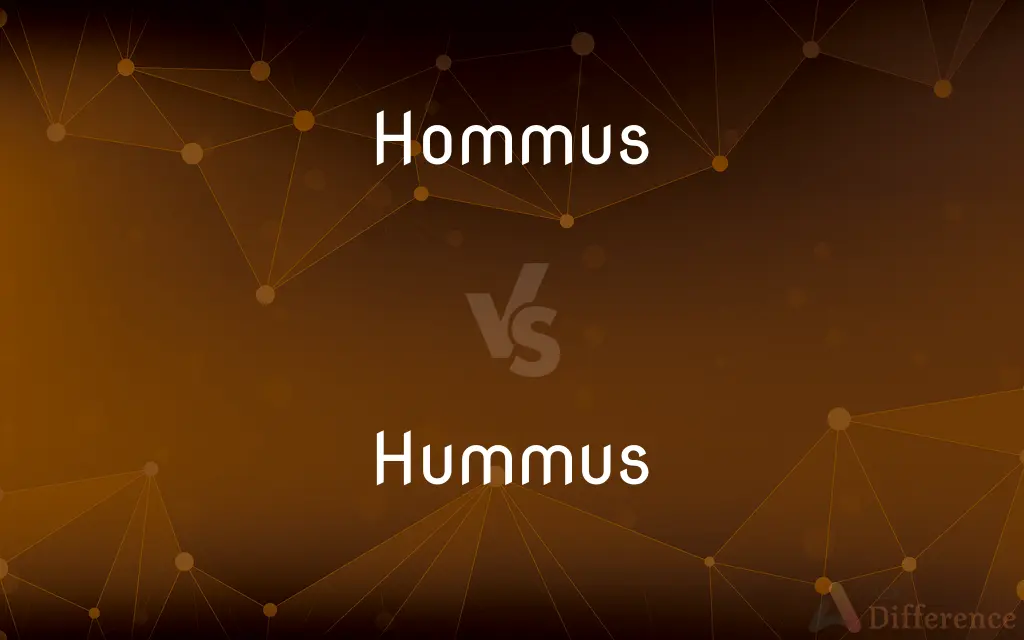Hommus vs. Hummus — What's the Difference?
By Tayyaba Rehman & Fiza Rafique — Updated on March 31, 2024
Hommus and hummus refer to the same Middle Eastern spread made from chickpeas, though "hummus" is the more commonly accepted spelling worldwide.

Difference Between Hommus and Hummus
Table of Contents
ADVERTISEMENT
Key Differences
Hommus is an alternative spelling that captures the same beloved chickpea spread's essence, often found in various cultural contexts. This variation emphasizes regional linguistic preferences, where different communities might adopt alternate spellings based on phonetic transliteration from Arabic. Hummus, on the other hand, has become the globally recognized term for this dish, standardized in most English-speaking countries and international culinary circles. It's not just a matter of spelling; it's about global culinary identity and the acceptance of a single term to represent a dish known and loved around the world.
While hommus may appear in certain cookbooks, restaurant menus, or local dialects, emphasizing a more traditional or localized approach to naming, hummus is favored in global discussions, food packaging, and international recipes, highlighting a unified culinary lexicon. Whereas hommus spelling might reflect a closer adherence to certain dialects' pronunciation, hummus has been adopted widely across culinary literature and media, signifying a consensus on naming this popular dish, which can affect its recognition and marketing.
Both spellings capture the essence of a dish that transcends cultural boundaries, yet the choice between hommus and hummus can signal subtle differences in cultural identity, culinary tradition, and globalization's impact on food nomenclature.
Comparison Chart
Spelling Variations
Less common, regional
Widely accepted, standardized
Recognition
May be preferred in certain regions
Internationally recognized
ADVERTISEMENT
Linguistic Origin
Reflects phonetic transliteration from Arabic
Standardized spelling in English
Culinary Identity
Can indicate a traditional or localized approach
Signifies a global culinary standard
Marketing Impact
Less universally recognized
Broadly marketable and understood
Compare with Definitions
Hommus
A healthful food high in protein and fiber.
I often include hommus in my diet for its health benefits.
Hummus
Recognized for its nutritional content, including protein and healthy fats.
Adding hummus to your meals is a great way to boost protein intake.
Hommus
A culinary term that can reflect regional spelling preferences.
You'll find hommus listed under appetizers in many local restaurants.
Hummus
Subject to culinary innovation, with variations like beet or avocado hummus.
This avocado hummus is a delicious twist on the traditional recipe.
Hommus
A versatile Middle Eastern dish used as a dip, spread, or accompaniment.
My grandmother's recipe for hommus always includes a pinch of cumin.
Hummus
A dip or spread made from mashed chickpeas blended with tahini, olive oil, lemon juice, and garlic.
I love spreading hummus on my morning toast for a quick, nutritious breakfast.
Hommus
A traditional food with variations across different cultures.
In our family, hommus is made with extra lemon for a tangy flavor.
Hummus
The universally accepted spelling in culinary circles.
Most cookbooks recommend using canned chickpeas for an easy hummus recipe.
Hommus
A creamy spread made from chickpeas, tahini, olive oil, lemon juice, and garlic.
For the party, we made a large bowl of hommus served with fresh vegetables.
Hummus
A staple in Middle Eastern cuisine, enjoyed worldwide.
Our local Mediterranean restaurant serves the creamiest hummus.
Hummus
Hummus (, ; Arabic: حُمُّص, 'chickpeas'; full Arabic name: ḥummuṣ bi-ṭ-ṭaḥīna Arabic: حمص بالطحينة, 'chickpeas with tahini') is a Middle Eastern dip, spread, or savory dish made from cooked, mashed chickpeas blended with tahini, lemon juice, and garlic. The standard garnish in the Middle East includes olive oil, a few whole chickpeas, parsley, and paprika.In Middle Eastern cuisine, it is usually eaten as a dip, with pita bread.
Hummus
A smooth thick mixture of mashed chickpeas, tahini, oil, lemon juice, and garlic, used especially as a dip for pita.
Hummus
A Levantine Arab dip made of chickpea paste with various additions, such as olive oil, fresh garlic, lemon juice, and tahini, often eaten with pitta bread, or as a meze.
Hummus
A thick spread made from mashed chickpeas, tahini, lemon juice and garlic; used especially as a dip for pita; originated in the Middle East
Common Curiosities
What is the main ingredient in both hommus and hummus?
Chickpeas are the primary ingredient in both hommus and hummus.
Can hommus and hummus be used interchangeably?
Yes, the terms can be used interchangeably, though "hummus" is more widely recognized.
What are common additions to hommus/hummus?
Common additions include olive oil, paprika, parsley, and various spices.
Is hummus considered a vegan food?
Yes, hummus is vegan, made from plant-based ingredients.
Which spelling is more commonly used worldwide?
"Hummus" is the more commonly used spelling worldwide.
Can hommus/hummus be homemade?
Yes, both can easily be made at home with chickpeas, tahini, lemon juice, and garlic.
How long can hummus be stored?
Homemade hummus can be stored in the refrigerator for up to a week.
Are hommus and hummus the same?
Yes, hommus and hummus refer to the same dish, with the difference lying in the spelling.
Is there any difference in taste between hommus and hummus?
No, the taste does not differ; variations depend on the specific recipe, not the spelling.
What’s the best way to serve hummus?
Hummus can be served as a dip with vegetables, pita bread, or as a spread on sandwiches.
Can hummus be frozen?
Yes, hummus can be frozen, though it may affect texture upon thawing.
Is hommus or hummus better for health?
Both are equally healthful, offering protein, fiber, and healthy fats.
Does the spelling affect how hommus/hummus is prepared?
No, the preparation method remains the same, regardless of spelling.
Why are there different spellings for hummus?
Different spellings arise from variations in transliteration from Arabic to English.
What cultural significance does hummus have?
Hummus has significant cultural importance in Middle Eastern cuisines, symbolizing hospitality and community.
Share Your Discovery

Previous Comparison
Province vs. Region
Next Comparison
Shame vs. AshameAuthor Spotlight
Written by
Tayyaba RehmanTayyaba Rehman is a distinguished writer, currently serving as a primary contributor to askdifference.com. As a researcher in semantics and etymology, Tayyaba's passion for the complexity of languages and their distinctions has found a perfect home on the platform. Tayyaba delves into the intricacies of language, distinguishing between commonly confused words and phrases, thereby providing clarity for readers worldwide.
Co-written by
Fiza RafiqueFiza Rafique is a skilled content writer at AskDifference.com, where she meticulously refines and enhances written pieces. Drawing from her vast editorial expertise, Fiza ensures clarity, accuracy, and precision in every article. Passionate about language, she continually seeks to elevate the quality of content for readers worldwide.















































